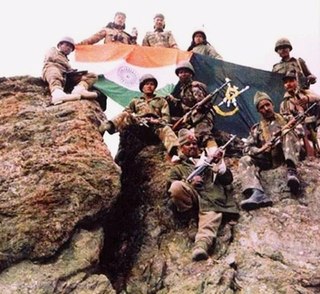
The Kargil War, also known as the Kargil conflict,[note (I)] was fought between India and Pakistan from May to July 1999 in the Kargil district of Ladakh and elsewhere along the Line of Control (LoC). In India, the conflict is also referred to as Operation Vijay, which was the codename of the Indian military operation in the region. The Indian Air Force acted jointly with the Indian Army to flush out the Pakistan Army and paramilitary troops from vacated Indian positions along the LoC, in what was designated as Operation Safed Sagar.
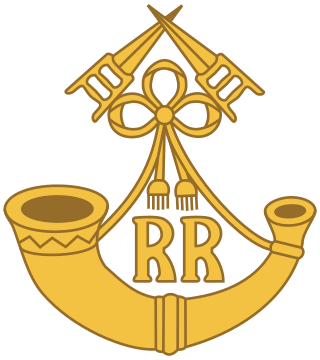
The Rajputana Rifles is the oldest rifle regiment of the Indian Army. It was originally a part of the British Indian Army, when six previously existing regiments were amalgamated to form six battalions of the 6th Rajputana Rifles. In 1945, the numeral designation was dropped from the title and in 1947 the regiment was transferred to the newly independent Indian Army. Since independence, the regiment has been involved in a number of conflicts against Pakistan, as well as contributing to the Custodian Force (India) in Korea under the aegis of the United Nations in 1953–54 and to the UN Mission to the Congo in 1962. As a rifle regiment, it uses a bugle horn as its insignia, the same as the British Light Division, but unlike its British counterparts, the Rajputana Rifles march at the same march pace used in the Indian Army as a whole.
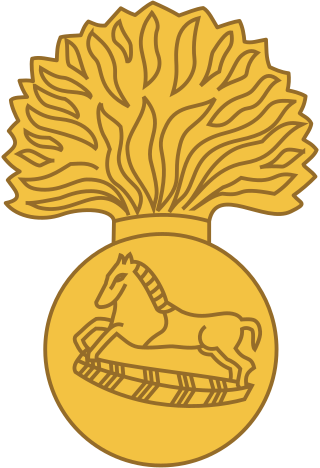
The Grenadiers is an infantry regiment of the Indian Army, formerly part of the Bombay Army and later the pre-independence British Indian Army, when the regiment was known as the 4th Bombay Grenadiers. It has distinguished itself during the two world wars and also since the Independence of India. The regiment has won many battle honours and gallantry awards, and is considered to be one of India's most decorated regiments with three Param Vir Chakra awardees in three different conflicts.

The Kumaon Regiment is one of the oldest infantry regiments of the Indian Army. The regiment traces its origins to the 18th century and has fought in every major campaign of the British Indian Army and the Indian Army, including the two world wars, and is one of the highest decorated regiments of the Indian Army.
The Battle of Tololing was a pivotal battle in the Kargil War between India and troops from one full battalion of Pakistan’s Northern Light Infantry who were aided by Pakistani irregulars in 1999.
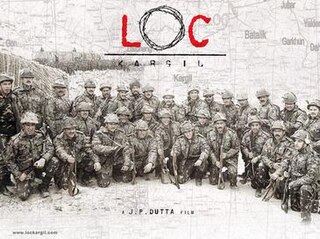
LOC Kargil is a 2003 Indian Hindi-language historical war film based on the Kargil War fought between India and Pakistan, produced and directed by J. P. Dutta under his banner "J. P. Films". The film features an ensemble cast of Bollywood stars and music composed by Aadesh Shrivastava and Anu Malik, with the former composing the score and the latter composing the songs.
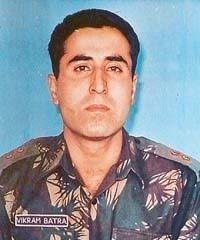
Captain Vikram Batra, PVC was an Indian Army officer. He was posthumously awarded the Param Vir Chakra, the highest Indian military decoration, for his actions during the Kargil War; on 7 July 1999, Batra was killed while fighting Pakistani troops around Area Ledge, Point 4875, in the Kargil district of erstwhile Jammu and Kashmir.

The 8th Mountain Division is a division of the present-day Indian Army that specialises in mountain warfare.
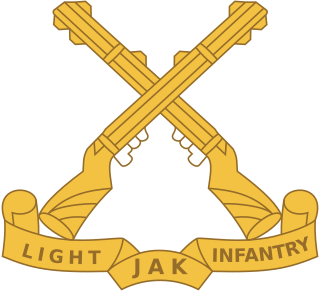
The Jammu and Kashmir Light Infantry is an infantry regiment of the Indian Army. The regimental center is in Srinagar's Airport Complex at Awantipora with a winter setup near Jammu. Its regimental insignia consists of a pair of crossed rifles. The regiment mostly consists of volunteers from the state of Jammu & Kashmir and ethnic groups from the state. The Jammu and Kashmir Light Infantry is considered to be one of the most decorated regiment of the Indian army having won 1 Param Veer Chakra and 3 Ashok Chakra. Naib Subedar Chuni Lal of the 8th battalion Jammu and Kashmir Light Infantry is one of the most decorated personnel of the Indian Army.

Subedar Major and Honorary Captain Yogendra Singh Yadav PVC is a retired Indian military junior commissioned officer, who was awarded India's highest military award, the Param Vir Chakra, for his actions during the Kargil War. He is the youngest recipient of the Param Vir Chakra to date, having received it at the age of 19.

The Naga Regiment is an infantry regiment of the Indian Army. It is among the youngest regiments of the Indian Army - the first battalion was raised in Ranikhet, Uttarakhand in 1970. The regiment recruits mainly from Nagaland, in northeast India.

Subedar and Honorary Captain Karam Singh PVC, MM was an Indian soldier and a recipient of the Param Vir Chakra (PVC), India's highest award for gallantry. Singh joined the army in 1941, and took part in the Burma Campaign of World War II, receiving the Military Medal for his actions during the Battle of the Admin Box in 1944. He also fought in the Indo-Pakistani War of 1947, and was awarded the PVC for his role in saving a forward post at Richhmar Gali, south of Tithwal. He was also one of the five soldiers chosen to raise the Indian flag for the first time after independence in 1947. Singh later rose to the rank of subedar, and was conferred the rank of honorary captain before his retirement in September 1969.
Ghatak Platoons are special operations capable reconnaissance platoons consisting of Shock troopers these are present in every infantry battalion of the Indian Army. Ghatak is a Sanskrit word meaning "killer" or "lethal". Their name was given to them by General Bipin Chandra Joshi. They act as shock troops and spearhead assaults ahead of the battalion.

The Battle of Tiger Hill encompasses the battles fought in and around the peak of Tiger Hill between the Indian Army and Pakistan from the final week of May till second week of June 1999, during the Kargil War. The battle, with the concomitant battle for the adjoining peak of Tololing, culminated in Indian forces capturing Tiger Hill. The Tiger Hill area, including Point 5100, is to the west of Tololing. Peaks in Tololing include Point 5140 and Point 4875 and others.

Kurukshetra is a 2008 Indian Malayalam language war film written and directed by Major Ravi. It is a prequel to the 2006 film Keerthi Chakra and the second installment in the Major Mahadevan film series, with Mohanlal reprising his role as Colonel Mahadevan The film is based on the Kargil conflict of 1999 between India and Pakistan. The political situation of the conflict is portrayed from an Indian perspective.

Major Padmapani Acharya, MVC was an officer in the Indian Army. He was awarded the second highest Indian military honour, Maha Vir Chakra posthumously for his actions during the Kargil War on 28 June 1999.
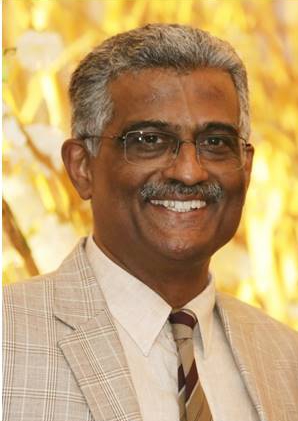
Colonel Magod Basappa Ravindranath VrC was an Indian Army officer. He was awarded the Vir Chakra for his actions in the Battle of Tololing during Kargil War in 1999. He was commanding the Indian Army's 2 Rajputana Rifles battalion that successfully captured the strategic heights of Tololing, Point 4590 and Black Rock in the Drass sector that dominated the Srinagar - Leh Highway, the first major victory that changed the course of the Kargil War.

The 54th Infantry Division is an Infantry division of the Indian Army. The Division was raised as an Infantry Division, but was converted into a Reorganised Amphibious Formation (RAMFOR) in 2011. It is currently the only division of the Indian Army which carries out Amphibious warfare. The division is headquartered at Secunderabad in Telangana and is a part of XXI Corps. The Division is commanded by an Officer of the rank of Major General titled General Officer Commanding (GOC).
Major Vivek Gupta MVC was an officer in the Indian Army. He was posthumously conferred the Maha Vir Chakra, India's second highest war-time military honour, for his actions during the 1999 Kargil War.
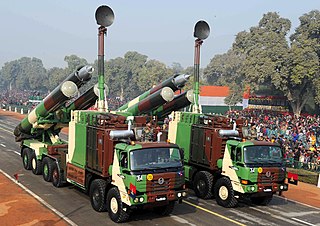
1889 Missile Regiment (Kargil) is a missile equipped regiment, which is part of the Regiment of Artillery of the Indian Army.

















